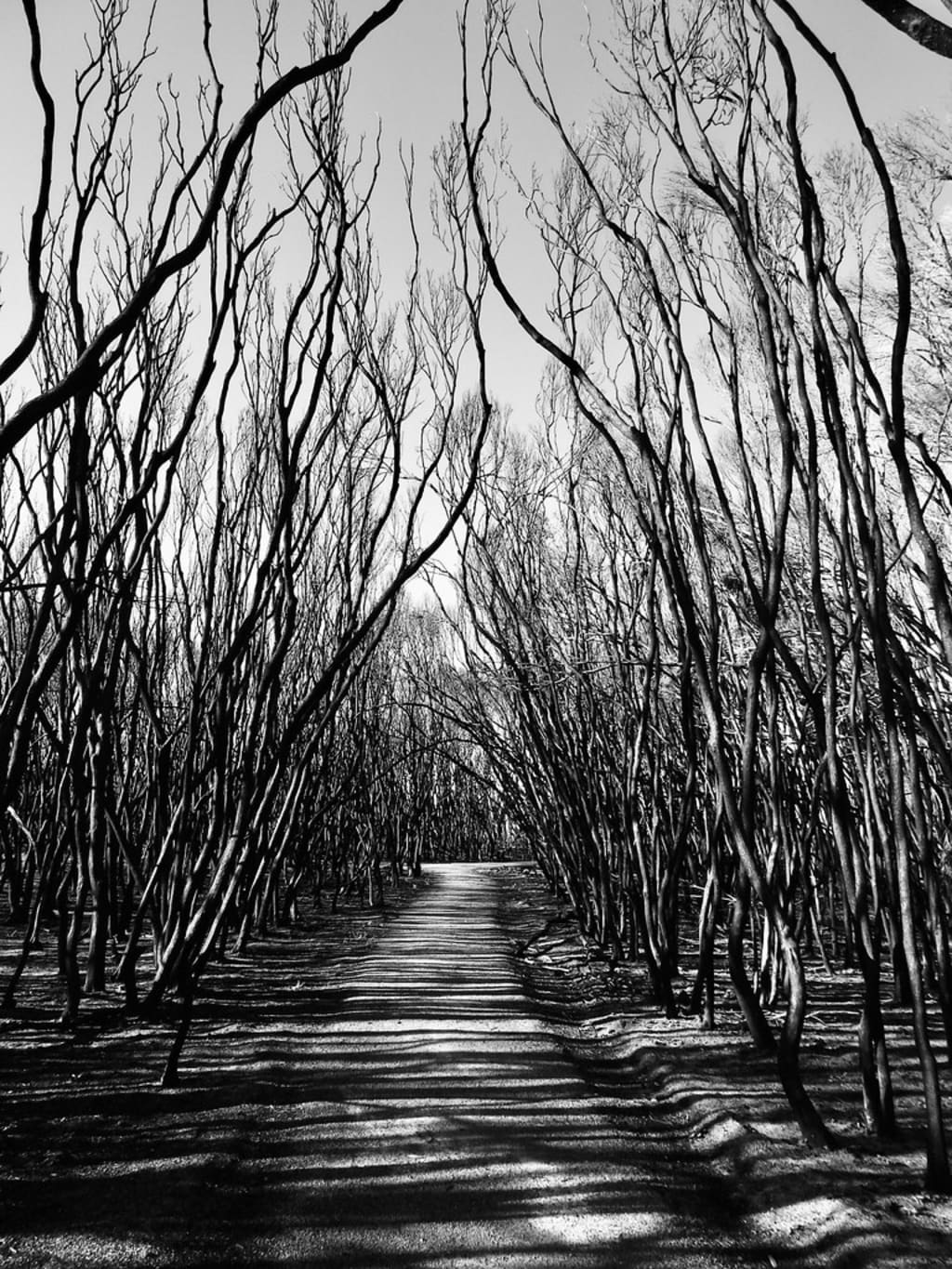A Black Summertime
At the end of 2019, the world watched on as Australia experienced horrifying bushfires. This is a multi-generational story of how the fires encroached upon one family in the state of Victoria, the place I currently call home. Communities, such as those who live in small towns like Mallacoota, are still recovering in more ways than one, as globally we all grapple with how the climate crisis will sculpt our immediate futures.

"To some not insignificant extent, who you are comes down to where you stand in relation to catastrophe. Perhaps it is that they have not been touched yet. Not yet been burnt."
Danielle Celermajer ‘Summertime: Reflections on a Vanishing Future’
Had Harry known that last summer would, indeed, be the last, he might have done things differently. But, the unchangeable reality was that he had spent those weeks sleeping until 3 p.m., before going downstairs, face unwashed, to scavenge through the lunch everyone had shared a couple of hours before, standing with the fridge door open and eating thin strips of charcuterie straight from their plastic packing, taking bites from uneven wedges of cheese, absentmindedly folding slices of bread into his mouth, and washing it down with whatever was in the drinks holder. Then he would go to the lounge, turn the air conditioning down a few degrees, and sit in front of the TV, scrolling on his phone, until dinnertime.
After dinner, he would usually go back to the TV, outlasting his parents and even his grandpa before crawling into bed sometime before dawn. Or, perhaps, he would head down to the beach and join the small hoard of other teenagers to smoke stolen cigarettes and drink warm tinnies, occasionally the heat of pilfered spirits, under a glossy night sky. He had known some of the locals, like Timo and Darren, since they were kids. They had spent their pre-teen years roaming the bush and frying ants, Christmas beetles, or whatever bugs were unfortunate enough to cross their paths, through shards of broken glass they had found on the side of the road. Darren’s dad had caught them one day and they were all clipped hard round the ear, not because of the small lives they were taking, but because of the fire ban. But now, Harry tended to hang out with the kids like him, who came from the city for their holidays. He would share a nod with Timo, occasionally a bit of banter when he sauntered down to the huddle on the beach to bum a ciggie. But that was it.
Now, as they drove along the familiar roads, he stared out the window in a way he hadn’t done since he was little and used to think that he might spot koalas snoozing in the gum trees once they passed the yellow koala crossing road signs. But there were fewer gums than before. Now Harry noticed the stretches of neat monoculture pines that had been proliferating since his childhood with a new weariness; trees destined for fast-growing short lives to end up as cheap construction material. At some points, they gave way to pastures and rambles of the native banksias, wattles, tall grasses, and the beloved eucalyptus trees with their long waxed leaves, intermixed with introduced elms and poplars. But it was still all green, surprisingly so, and his anxiety was tinged with relief.
He smelt it before he saw it. The green evolved into ashy blackness, the stench of burnt-out life hung fast and thick in the air. Razed blackened ground, stripped and skeletal trunks howling to the sky, the odd ghost of a lost building. The occasional fence or patch of grass, somehow untouched, oblivious to the desecrated landscape they stood upon.
His mum turned off the low hum of the car radio, and his dad’s grip on the steering wheel tightened. The silence engulfed them as the devastation stretched on and on.
Harry waited to see the old barn, indicating that the next semi-concealed turning would be theirs, leading up the sandy drive to his grandparent’s bush house. Even amongst the charred forest, he somehow had expected to see it, his geographical anchor rooting him to a place that he hadn’t realised was central to his being. But, of course, it was gone. A forgotten, sunbaked timber barn was prime pickings for a hungry fire.
He trawled his memory for the trees of their bushland, the ones he used to pass on his walks along the trails with Pop before it became too much of a strain for the old man to keep up with the growing boy. He recalled the hollowed-out dead gum that was a permanent residency for a few generations of brushtail possums. When his dad had joined them, he would suck on his teeth and shake his head, ‘That’s a blast furnace waiting to happen’.
When he went in the autumn, he would help his Pop and dad rake leaves, twigs, and fallen branches. His dad wanted everything pristine, and often the two old men (one old old, the other just old) would argue over a particular branch.
‘That’s home to my fungi and termites, sometimes the echidnas stop by.’
‘Well, they’ll lose their home, and you’ll lose yours if the drought keeps up.’
The heat from the burn-off was extraordinary. The pent up energy stored in the wood from their seasons of growth and dry heat, suddenly released, caused the flames to jump higher. Harry’s cheeks glowed and his eyes went dry, causing him to inch back. He loved the burn-off, but he loved putting these fires out more. The powerful spray of water smothering the two, perhaps three, small fires once they had passed their zenith. His dad would spend a long time blasting the ground with extra water, fearful of pent up heat brought to life again.
This summer, in the city, they watched the fires creep from the hot North towards the fickle South, where one day it was a temperate clear-skied 24℃, and the next the winds and thermometer would rise to over 40℃, causing the air to thicken and catch in your chest, before, after a day or two, a coolness would sweep in and by 4 p.m. the rains had come and jumpers were pulled on as the temperature dropped.
They watched the fires via news images of firemen sharing bottled water with koalas, Twitter feeds, and that little app they had all downloaded with its red icons of blazes and traffic light warning system, but had thought little of it. This happened every year, to some degree. Sometimes better, sometimes worse, sometimes really bad. Then, what had looked like worse fast became really bad. Firefighters from the winter cloaked northern hemisphere were flown in to help control the inferno in a country where most of the population cleaves to the hospitable coastline whose life-sustaining forests are cleared for houses and farmland.
The words "unprecedented" and "climate crisis" were bandied around and then rebutted by its fossil fuel doting prime minister and climate change sceptic controlled press. The Red Centre lived up to its name, averaging a daily temperature of 40℃. The country rolled their eyes at the ruling coalition parties, who claimed arsonists and greenies were the main cause of the inferno.
Harry, like his peers, complained of the inconvenience. He had ordered an LP online because it was cheaper than his local record store, but now the roads were closed off due to the fires, so his vinyl was stuck in some warehouse across the country. He thought about amending his order and paying $50 to get it delivered by air, but then he might as well just go and buy it from the store.
On December 20th, after yet another 40℃ day and as a smoky malaise crept over their city, his parents made the decision that they wouldn’t be going as usual to his grandparent’s for the summer, or at least not yet. The fires were unpredictable; they established their own weather systems generating vortexes and lightening over the trees, they leapt and danced in unexpected directions, they ate up the moisture-filled rainforest. Harry shrugged. Then as an afterthought, asked ‘what about Pop and Grammy?’. His parents exchanged one of their looks accompanied by a sharp intake of breath. ‘They’ll stay put. Pop thinks it will probably be fine.’
‘Oh, then why can’t we go?’
‘Harry this is not negotiable. We are staying.’
This summer, he was back to diurnal life. He watched as the sky of their suburb turned a murky purply-brown, the midday sun shrouded in ashy drifts from the fire. The air was thick, but he still wanted to go and play footie. His mother said no, pulling up the air quality app marked ‘Hazardous!’ and its infographic of a little red man wearing a gas mask. Harry shrugged. His dad stayed hunched at his makeshift monitoring system at the dining room table, consisting of the family desktop, his laptop, and tablet, so he could monitor the fires, weather, and Twitter at once. He had been glued to it since the fires started to swell in Pop’s corner of the state—still 200 km away, but a few leaps and bounds for a hungry fire on a windy day.
His mum ordered them all face masks with changeable filters via the app, but they wouldn’t arrive before the little man was a smiling green colour, and the air had been declared Good.
Christmas was not really Christmas partly because they weren’t at the bush house, but mainly because everybody’s mind was elsewhere, hung up on an unknowable future. Harry’s mum would never say it out loud, but perhaps the fact they hadn’t been able to have another child was really an aching blessing in disguise. They ate squeezed at one end of the table, most of it still taken up by his dad’s setup.
The next day the laptop monitor started to show weather images of a pulsing hot air cloud sprawling over their country, a country as big as a continent and lonesome as an island, travelling the breadth from north-west to south-east. His mum’s tablet was added to the setup, barking out warnings telling people to abandon their holidays and other fire service updates.
Harry trudged through his old Facebook contacts, something he hadn’t used for years, and found Timo. He drafted a message, deleted it, then listened to his dad’s frantic worry, wrote it again and sent it. By evening, his grandparents had de-camped from the bush house, on a stretch of land patchy with people, and moved onto the sofa of Timo’s parent’s apartment on the seafront, protected by buildings and the tourist economy the fire services had been instructed not to let burn. Or so they thought.
On the last day of the year, midnight descended at 8 a.m. The temperature skimmed 50℃, winds howled at 80 km/h, and the sole road to the town was closed, a severed artery. The fires had arrived.
His grandparents were not so good with their phones, but they got the occasional message from Grammy. Harry followed Timo’s garbled feed across his socials, horrified at the red-black light and crowded beach. Despite living a half-hour walk to the beach, Harry had never seen Pop in the sea. Except he would have to be now, as the thousands cowering on the beach were told the only thing to do was take refuge underwater.
They sat in stillness. There was nothing to be done except to flit their eyes screen to screen, showing various details of their summer escape burn.
Five days later, his grandparents reached them, after being stranded, thirsty, and then evacuated by the Navy. Someone had offered to drive them over to where their house once stood, but his jaw clenched wide-eyed Pop refused. The same day they arrived in the city, the sky over their beloved country town began to rain embers.
Had Harry known that last summer might be his last to lie under the gums, to help Grammy in the gardens, to share a laugh with Pop, he would have done things differently. But, as it was, the earth continued to rotate on its tilted axis, moving the southern hemisphere out of the sun’s direct stare and stirring vitality in the north where, sooner rather than later, sparks began to catch.






Comments
There are no comments for this story
Be the first to respond and start the conversation.